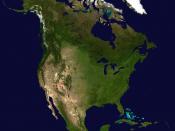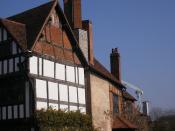The Transformation of European Society, by Gary B. Nash, analyzed the British colonies in North America. By highlighting major changes that took place in the colonies in the eighteenth century, Nash showed how the European mind was transformed from the rigid, hierarchal society of Europe, to the democratic, individualist of America. Nash's first point was about how economic change affected people's views. Since there was so much land in the colonies, it was easier for people to "get rich quick" and climb the social ladder. This was one difference between American and European societies. In Europe, there was a large disparity between the rich and the poor. If you were born a blacksmith's son, you would die a blacksmith. But in America, the abundance of land meant that there were opportunities for growth and change. Poor farmers could become rich businessmen, seemingly. Ironically, it was the Protestant work ethic, which "shattered the utopian dream .
. . where men and women worked for the commonweal." This work ethic, which was prevalent in the northern colonies, helped to develop an individualistic, competitive society as opposed to the community-centered Europe. Though the Protestant work ethic was not as strong in the southern colonies, the abundance of slaves caused a competitive mind-set to develop there as well. Nash noted that while this competitive spirit "unleashed economic energies," the desire for land also led to conflicts with the Indians, Spanish, and French. Nash's second point focused on social change in North America. According to Nash, Europeans "accepted the naturalness of hierarchy in human affairs." They did not try to rise above what they considered to be their economic and social status in life. At the beginning of the seventeenth century most of the people living in Britain's colonies were of the...


